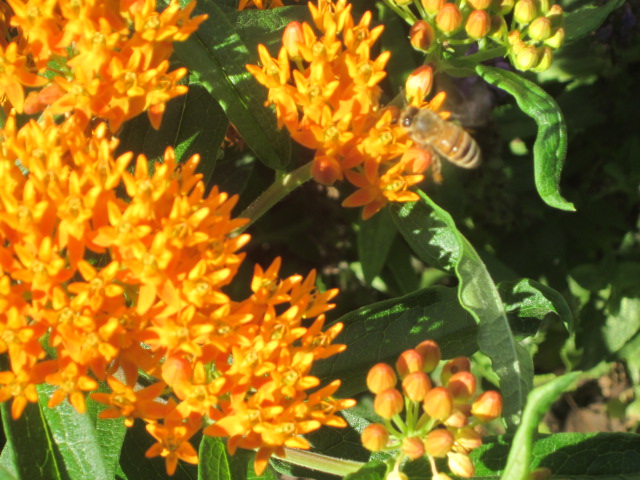AWARE Essa meeting focuses on disappearing bees, effects of neonicotinoids and loss of food security

By Anne Learn Sharpe AWARE Essa
In spite of a spring snowstorm, more than 70 people gathered at Utopia Hall in Essa Township on Saturday, March 22, to watch the movie Vanishing of the Bees. Unfortunately, due to technical difficulties, only 15 minutes of the movie was shown, but on a positive note, this allowed more time for speaker presentations and audience participation. The disappearance of honeybees and many other pollinators, the effects of neonicotinoid pesticides and the long-term loss of food security were issues of concern raised in discussion.
Huronia Beekeepers Association
The Huronia Beekeepers Association was well represented by president Peter Dickey and BJ McCabe. Peter, a fourth-generation beekeeper from Innisfil opened with an overview of bee losses locally. In Ontario, honey production declined by 32% in the 2012 to 2013 season. BJ explained several projects initiated by the Huronia Beekeepers: “Honey I’m Home,” a collection of recipes featuring honey that BJ has put together is available on the association’s website. The Adopt-a-bee program helps local beekeepers manage the bee decline crisis and continue their work.
Neonicotinoids and the Ontario Bee Health Working Group
Neonicotinoids, Peter told the audience, are considered by beekeepers to be a prime cause of bee deaths. These residual pesticides, widely used on corn and soybeans, compromise the immune systems of honeybees and also reduce their navigational skills, preventing them from foraging, communicating and finding their way home. Peter emphasized that cold weather does not kill bees.
On March 19, a report that sidesteps banning the controversial neonicotinoids was released from the provincially mandated Bee Health Working Group and was given a thumbs-down from the Ontario Beekeepers Association. André Flys, a beekeeper from Schomberg, was one of the four beekeepers on the committee who advocated for a ban to be enforced in time for the 2014 growing season. But the beekeepers were overruled by other participants: the farmers who use the pesticides and the corporations who produce them.
Kate Harries, vice chair of AWARE Simcoe, echoed the beekeepers’ dissatisfaction with the report from the Ontario Bee Health Working Group and stressed the need to communicate our concerns to the provincial government.
Pollinator-friendly native plants
Not only pollinators but the birds who eat them are declining because of the use of residual pesticides. As a gardener and owner of Return of the Native nursery, Kate recommended native plants as a source of non-toxic food for pollinators. Invasive species threaten native plant populations in green spaces and need to be pulled by hand, without the use of pesticides. Gardening with native plants also supports pollinators, and Kate suggested small-flowered plants such as milkweed or Queen Anne’s Lace as species that are especially useful.
Native plant corridors
Ian Payne from Not So Hollow Farm in Mulmur questioned the widespread practice of trucking honeybees long distances to pollinate crops. Native bee populations are displaced from their food sources by the arrival of large numbers of honeybees. Ian also advocated planting native species to attract a wide variety of pollinators as a strategy, but he stressed that planting isolated gardens is not enough. We need to create continuous corridors of food plants for pollinator species. This involves enlisting the support of neighbours and communities.
In her message of support, Essa’s Deputy Mayor, Sandie MacDonald, promoted the health benefits of honey and urged people to take action through their government representatives.
Questions and opinions from the audience energized the discussion. Local naturopath, Dr. Werner Fabian, voiced his belief that agriculture today is out of balance with Nature and that both beekeeping and farming have become profit oriented to the point of disregarding the well-being of the creatures that sustain those enterprises. In his address, André Flys stopped short of assigning blame to any particular group: “We’re all part of the problem.”
Solutions
Which leads us to the other side of the equation: We must all be part of the solution. Coming to a meeting on a snowy Saturday morning is a first step. We learned some other important strategies:
- As citizens: pressuring government to recognize the scope of the problem and take effective action, including a ban on neonicatinoids. We can make a difference, either individually or through groups such as the Ontario Beekeepers Association, the Huronia Beekeepers Association, the National Farmers Union and AWARE Simcoe.
- As gardeners: plant native species and organize neighbourhoods and communities to create corridors of pollinator-friendly plants. Discover your local native plant grower to make sure the plants you buy have not been treated with residual pesticides.
- As volunteers: offer your time with organizations to help pull invasive species from wild spaces.
- As consumers: buy organic and local food as much as possible. Shop at markets where you can ask how produce was grown. Help create a demand for pesticide-free food.
- As donors: give your financial support to organizations working to help pollinators.
- As lifelong learners and teachers: go to more meetings, seminars and workshops. Read widely, listen carefully and share what you learn.
http://www.huroniabeekeepers.com/









Leave a Reply